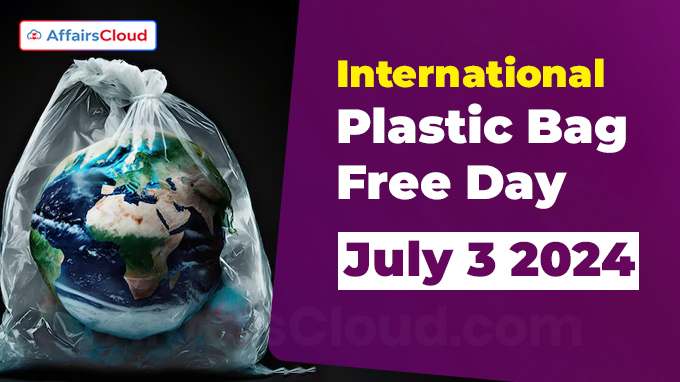 International Plastic Bag Free Day is annually observed across the globe on 3rd July to raise awareness of the environmental impact caused by Single-Use-Plastic (SUP) like plastic bags, which are harmful to ecosystems, wildlife, and human health.
International Plastic Bag Free Day is annually observed across the globe on 3rd July to raise awareness of the environmental impact caused by Single-Use-Plastic (SUP) like plastic bags, which are harmful to ecosystems, wildlife, and human health.
- The day also emphasises eliminating or reducing the use of SUP bags and promotes reusable bags as a more sustainable alternative to disposable plastic bags.
- The day serves as a reminder to individuals, communities, and governments worldwide of the urgent need to reduce plastic pollution.
Background:
i.Rezero, a member of the Zero Waste Europe (ZWE), initiated the International Plastic Bag Free Day which was first observed on 3 July 2008 in Catalonia, Spain.
ii.The observane gained wider recognition in 2009, after ZWE introduced the observance to the European Union (EU).
iii.In 2015, the EU passed the Plastic Bags Directive (EU 2015/720) to address the unsustainable use of lightweight plastic carrier bags. The directive is an amendment to the Packaging and Packaging Waste Directive (94/62/EC).
Note: International Plastic Bag Free Day is celebrated by nearly 1,500 organisations as part of the Break Free from Plastic (BFFP) Movement.
- BFFP Movement, launched in 2016, is a global movement working to achieve a future free from plastic pollution.
Key Points:
i.In July 2023, New Zealand has become the world’s first country to expand its ban on plastic bags in supermarkets to thin bags. This is a part of the wider government campaign against single-use plastics.
ii.In 2002, Bangladesh became the 1st country to legislate against the production and use of thin (20-micrometre thick or less) polythene bags, as they clogged the drainage systems during disastrous flooding.
Efforts of the Government of India:
i.In 2014, the Government of India (GoI) launched the Swachh Bharat Abhiyaan (Clean India Mission) to make India cleaner. The mission includes provisions for plastic waste management, such as promoting waste segregation at the source and setting up plastic waste management systems.
ii.The Ministry of Environment, Forest and Climate Change (MOEF&CC) notified the Plastic Waste Management Rules (PWMR), 2016, to provide a statutory framework for managing plastic waste in an environmentally sound manner across India.
iii.The MOEF&CC issued guidelines on Extended Producer Responsibility (EPR) for plastic packaging via the Plastic Waste Management Amendment Rules, 2022, in February 2022.
- In March 2024, the MOEF&CC notified the rules further amending the PWMR, 2016 namely the Plastic Waste Management (Amendment) Rules, 2024 in the Gazette of India.




